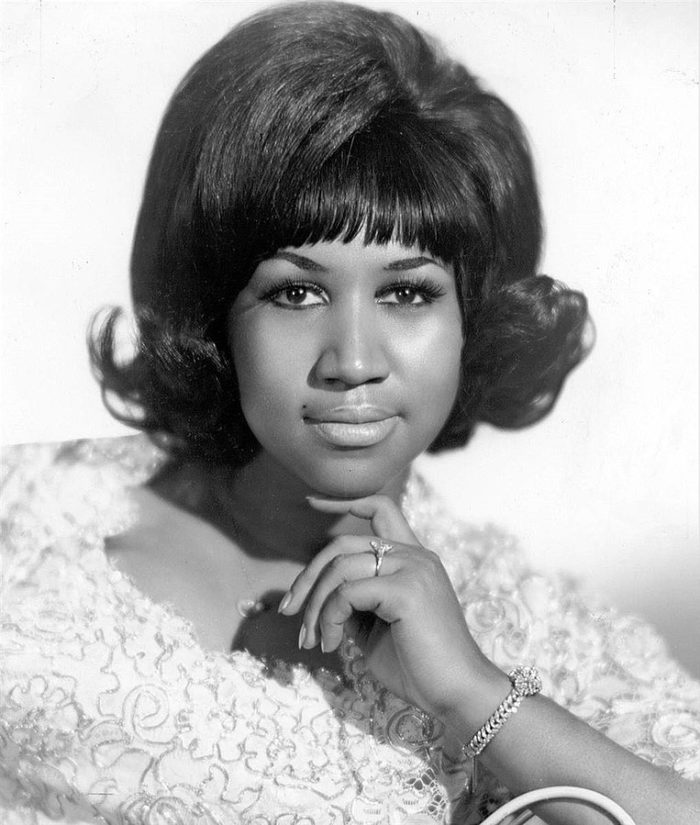by Michael Eric Dyson
For the last fifteen years of her colossal and regal existence, I had the great fortune of knowing, listening to, talking to, and spending time with the one and only Queen of Soul, Aretha Franklin. Her voice, the greatest we have heard, echoes still in the majestic command and sonic explosions that characterized her craft and spill from hi-fis, stereos, CD players, iPods, iPhones, streaming services, and wherever else the human voice can be heard. Her friendship was an oasis of refined elegance mixed with gutbucket humor and a zestful joie de vivre. She loved talking politics, and would text me, sometimes in all caps, or, even more humorously, would send complete messages in the subject lines of emails. Seeing her perform in all sorts of venues, from Virginia’s Wolf Trap, to the Essence Festival in New Orleans, or in front of the pope in Philadelphia, was always a thrilling experience. It may be a cliché—I once heard Toni Morrison say that clichés are clichés for a reason, they contain a truth—but she was truly one of a kind. A version of this essay appeared in the op-ed pages of The New York Times after her death in August 2018.

This image is in the public domain via Wikicommons.
If Aretha blessed Black America as an artist, she blessed Black women even more as a model of thriving in what James Brown famously sang of as a “man’s world.” He may have been the Godfather of Soul, but Aretha was the Queen of Soul, proving time and again that she could beat the men at their own game. Who can forget the great Otis Redding’s reaction to hearing Aretha belt out his memorable tune, “Respect?” Redding was naturally funky, but Aretha brought a feel to the song that was at once earthy and uplifting. If Redding’s version was memorable, Aretha’s was transcendent. She sang the song like her life depended on it. And in many ways, it did. She confronted domestic violence in her first marriage early on in her career, and her version of “Respect” can be read as an early declaration of #MeToo—her testimony in song about the need, and in her rendering, the demand, to be heard and respected. She literally spelled it out in a way that Redding hadn’t done—in a way he hadn’t needed to do. Aretha gave the song a female urgency that neither Redding’s throat nor pen could capture. In 1967, when he performed the song at the Monterey Pop Festival, he said, “This next song is a song that a girl took away from me. A good friend of mine, this girl, she just took the song.”
But Aretha didn’t just take Redding’s song; she also seized the power to tell her own story, and thus, inspired generations of women that came behind her to tell their own stories in song too. There would be no Chaka Khan, Whitney Houston, Mariah Carey or Beyoncé without Aretha. As much as her love for her people shines through in all that she did, her love and advocacy for Black women was even more striking, and arguably, more necessary. The way she fashioned her hair in an Afro sparked pride in Black women to embrace a hairstyle that was very much controversial when she first embraced it. Her lavish threads were preceded by the African themed gowns that she adopted, a flourish that helped to inspire the Black embrace of flowing African-centered clothes.
If she inspired Black women in strong self-expression, style and fashion, she also displayed extraordinary political courage too. One remarkable flash of Aretha’s political bravery was captured in an article in Jet magazine, the bible of everyday Black folk in the sixties and seventies. “Aretha Says She’ll Go Angela’s Bond If Permitted,” the title declared. The Angela it referenced is Angela Davis, the jailed social rebel who had made it onto the FBI’s 10 most wanted list in 1970. She was charged with murder, kidnapping and conspiracy for her role in the escape attempt of political prisoners from a California courtroom. Aretha went against her father’s wishes in offering to pay Davis’s bond.
“My daddy says I don’t know what I’m doing,” Franklin said. “Well, I respect him, of course, but I’m going to stick by my beliefs.” She didn’t call herself a feminist; the term was barely in circulation, yet Aretha was clearly acting as an independent and assertive woman intent on helping another woman, another sister. “Angela Davis must go free . . . I’m going to see her free if there is any justice in our courts . . . because she’s a Black woman and she wants freedom for Black people.”
Aretha brilliantly linked the freedom and plight of Black women with the freedom and plight of Black America. She also believed that her role as a wealthy celebrity obligated her to help other Black folk, especially Black women. “I have the money; I got it from Black people—they’ve made me financially able to have it—and I want to use it in ways that will help our people.”
Michael Eric Dyson—Distinguished University Professor of African American and Diaspora Studies, College of Arts & Science, and of Ethics and Society, Divinity School, and NEH Centennial Chair at Vanderbilt University—is one of America’s premier public intellectuals and the author of numerous New York Times bestsellers including Tears We Cannot Stop, What Truth Sounds Like, JAY-Z, and Long Time Coming. A winner of the 2018 nonfiction Southern Book Prize, Dr. Dyson is also a recipient of two NAACP Image awards and the 2020 Langston Hughes Festival Medallion. Former president Barack Obama has noted: “Everybody who speaks after Michael Eric Dyson pales in comparison.”


